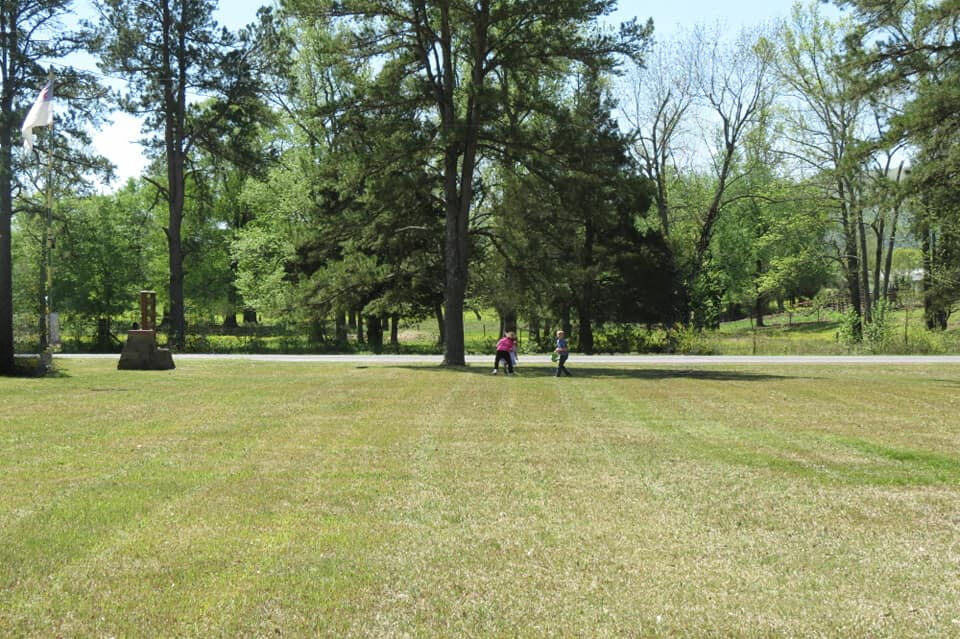
Christ's church
At Mountain ForK
• Pastor: Dr. Mark Berrier
• Location: 5696 Hwy 8 W
Mena, AR 71953
• Sunday School 9:45 AM
Worship 10:45 AM
• Women's Prayer: Wed 6:00 PM
Bible Study: Wed 7:00 PM

Christ's church
Mountain ForK
What We Believe
Christ’s Church believes any follower of Jesus Christ is our brother or sister. We have no written creed except for the Bible; we have no foundation except that revealed in scripture—Jesus Christ. We accept anyone who comes to us, just as Jesus did. We “follow the Lamb wherever He goes.”
Since there is an unbroken tradition of sharing in the Lord’s Supper every Sunday (Acts 20:7), we share His table regularly. It’s His table, not ours. He accepts anyone who comes to Him.
Faith is the absolute requirement for being a Christian; baptism by immersion is how Jesus Himself was baptized, so we practice that also. The mark of the Christian is love for all. What scripture teaches, we strive to live. Where scripture is silent, we believe everyone has a right to their own view in the Spirit of Christ.

Christ's church
Mountain ForK
Whether you are new to the Mena area or looking for a new church home, we would love to meet you!
If you have questions or would like to reach out for any reason, please do so.
Email the pastor at mberrier41@gmail.com

Christ's church
At Mountain ForK
Highway 8 West
3 Miles East of OK State Line
Welcome!


Christ's church
Mountain ForK
About the pastor
Mark Berrier has completed three degrees, BA, MA, MDiv and was enrolled in PhD Theology in Greek Patristics at the Univ. of Dallas for several years. In 2011 he received a Doctorate of Divinity from Dallas Christian College. He completed 47 years as a professor there. His professional objective is to preach and teach the Gospel of Jesus Christ and to simplify the vastness and complexity of the Bible for a contemporary world. He has over 100 articles on different theological subjects, many of which have been published. He has three books available including "The Bible for Busy People, books 1 and 2," on Old Testament and New Testament and a unique Commentary on Genesis 1-11, titled, "Our Astonishing God."
He has been seminar speaker and leader, interim minister and worship speaker for different denominations in TX, MO, IL, IA, OK, AR, NM, CO, CA, and KY. He taught graduate level Hebrew for Wycliffe Bible Translators, and for the University of Texas at Arlington.He has been teaching in the areas of Greek, Hebrew, Theology and Bible at Dallas Christian College since 1971. He has also led weeklong tours to Mexico City to work in orphan homes for many years to give his students the opportunity for a cross-cultural experience.
Mark and his wife Paula have been married for 57 years and with children, grandchildren and great-grandchildren, they have a total of 22 in their family.
Videos and Articles
Click this link to see a set of 66 videos that cover the entire Bible.
THE BIBLE FOR BUSY PEOPLE. Each video is 2-4 minutes long.
CAN WE BE SAVED AND THEN LOST?
There are several groups and people who teach “once in grace always in grace,” meaning that once you put your trust in Jesus, you can never turn away from him and lose your salvation. This is a very happy doctrine, because it means that no matter what you do or what you believe in later on—you will never be lost.
But there are some scriptures that deal with the question in the title: “Can We Be Saved and Then Lost?” These scriptures seem to give the lie to this doctrine.
Example 1: Hebrews 6 indicates that it is “impossible to renew to repentance” someone who has become deeply involved in salvation, but then fallen away, because by their behavior they are “crucifying Christ and putting Him up to public disgrace.” The people who received this “Letter to the Hebrews” are Jews who speak only Greek, but they are Jews who were being persecuted by their families and the Jewish community—because they believe in Jesus (Yesous in Greek). Jewish believers were tempted to return to Judaism and the Law of Moses because their families and the Jewish community back then were putting psychological pressure on them to turn back from Jesus. The writer of Hebrews describes these people with three or four attributes they have experienced: 1) they have “tasted the heavenly gift.” This means they have become totally involved in salvation by grace. “Tasted” is used earlier—Jesus “tasted” death for everyone. This does not mean a lick and then going away; it means total involvement in death. Jesus died! 2) They have become partakers (sharers in) the Holy Spirit. 3) They have tasted the goodness of God’s word and the powers of the age to come. They have experienced the miracle of salvation.
However, these people have “apostatized.” They have stopped trusting Jesus and are crucifying him in their lives, putting him up to public contempt. They have completely turned away from the salvation they had been freely given—and they cannot be returned to repentance as long as they keep crucifying Jesus.
But that is not the only scripture that deals with “once-in-grace-always-in-grace.” Jesus’ own teaching in his first-recorded parable in Matthew 13 teaches the same thing. What is known as the “Parable of the Sower” is about four kinds of soil and the seed of the word of God landing on that soil. Three of the soils produce life; only one does not. Seed sown along the path is eaten by the birds. But the seed that falls on the other soils produces life: 1) good soil; this person is the one who receives the word and bears fruit. 2) Soil with thorns and thistles; this person receives the word, but the pressures of persecution or the lure of wealth chokes the word, and it becomes “unfruitful.” It is alive, but not bearing fruit. 3) The rocky soil; this person, Jesus says, “receives the word with joy (he has life), and springs up, but when persecution or trouble come, he quickly falls away.” This kind of soil produces life for a time, but then loses its life. He lives, but then he dies. This does not sound like “once-saved-always-saved.”
Paul deals with similar people in Galatians. These are people who believed the gospel and were saved, but then turned from the grace of God to trusting in the Law of Moses. Paul had been followed there by people called “Judaizers.” These people taught that to be a “good Christian” one had to be circumcised and follow the Law. So some of the believers had turned from the good news of forgiveness to follow the Law of Moses. Here are the exact of words of Paul in Galatians 5:4: “You are cut off from Christ, you who would be justified by the law; you have fallen from grace.”
Is it possible to fall away from Christ once you believed? I believe the Bible teaches it is possible. But you have to “work at it.” You fall away if you trust something to save you other than Jesus. Can one be saved and then lost? It appears so from the scripture.
But this is from our human point of view. From God’s point of view, he already knew all along who would be in heaven. He has their names written in the Lamb’s Book of Life.
newest sermon videos
Previous Messages